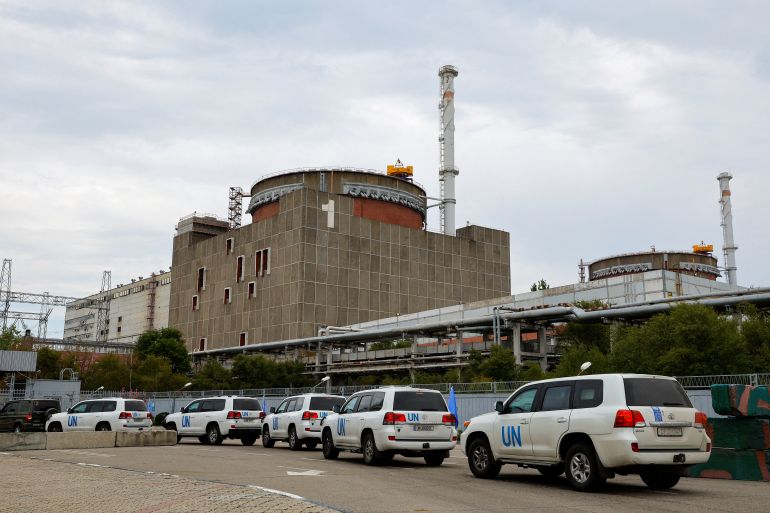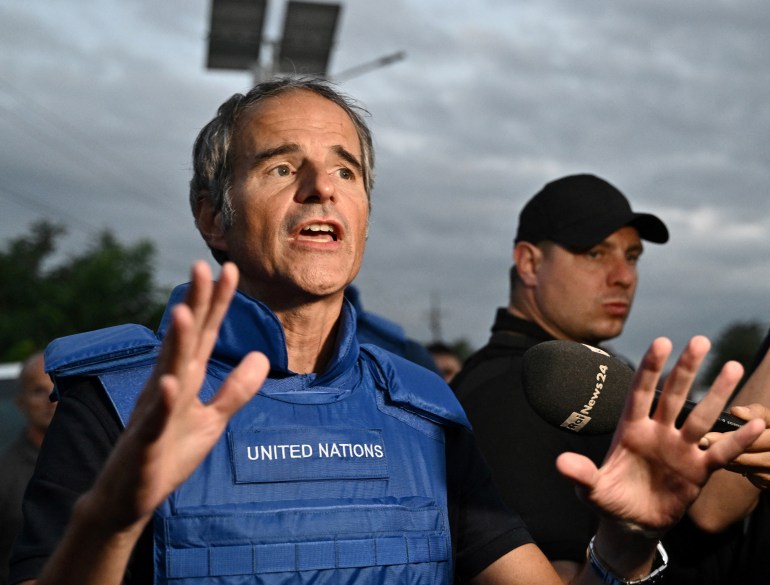UN team ‘not going anywhere’ after visiting Ukraine nuclear plant
IAEA chief says his experts are staying put after they cross into Russian-held territory in Ukraine and reach Europe’s biggest nuclear power plant.

The United Nations nuclear agency chief says his experts are staying put after they cross into Russian-held territory in Ukraine and reach Europe’s biggest nuclear power plant, where both sides warn of potential catastrophe.
An International Atomic Energy Agency (IAEA) inspection team braved intense shelling to reach the Zaporizhzhia nuclear power plant, arriving after a delay of several hours on Thursday in a large convoy with a heavy presence of Russian soldiers nearby.
Keep reading
list of 4 itemsIs Ukraine’s counteroffensive progressing?
Russia-Ukraine war: List of key events, day 190
Ukraine-Russia: The Weight of War
“We are not going anywhere. The IAEA is now there, it is at the plant and it is not moving. It’s going to stay there,” IAEA head Rafael Grossi, who personally led the mission, told reporters after returning to Ukrainian-held territory.

He said a group of IAEA experts had stayed behind at the plant and would provide an impartial, neutral and technically sound assessment of the situation.
“I worried, I worry and I will continue to be worried about the plant until we have a situation which is more stable, which is more predictable,” he said.
Al Jazeera’s Teresa Bo, reporting from Kyiv, said the IAEA team was looking to evaluate the level of damage at the site and the conditions of the Ukrainian personnel.
“A few days ago there were reports that several shells fell very close to where the nuclear reactors are located. This is a major concern and they will have to evaluate what is going on on the ground,” she said.
Ukraine and Russia accuse each other of creating a risk of a Chernobyl-like disaster by shelling near the plant, where the situation has been unravelling in recent weeks. Russia seized the plant early in the now more than six-month-old war.
Kyiv also accuses Russia of using the facility to shield its forces and of planning to steal its output by hooking it up to the Russian power grid. Moscow denies this but has so far rejected international calls to withdraw its troops from the plant.
Video footage released by Russia’s state news agency RIA showed IAEA inspectors, including Grossi, wearing safety helmets and being shown around the site by Russian energy officials, who pointed out what were described as damaged water pipes.
Russian Foreign Minister Sergey Lavrov said Moscow was doing everything to ensure that the plant could operate safely, and for the IAEA inspectors to be able to complete their tasks.
Earlier, Ukraine’s state nuclear company Energoatom said Russian shelling had forced the shutdown of one of the two reactors still operating at the site.
As the inspectors arrived at the front line, Russian and Russian-installed local officials accused Kyiv of sending troops on boats near dawn to try to capture the plant on Thursday, and of shelling the nearby Russian-held city of Enerhodar.
Kyiv accused the Russians of staging those incidents to blame Ukraine and block the IAEA visit.
Since its capture by Russia in March, the plant has been controlled by Russian troops but operated by Ukrainian staff.
The plant sits on the south bank of a huge reservoir on the Dnieper River that divides Russian and Ukrainian forces in central southern Ukraine. Before the war, it supplied more than a fifth of Ukraine’s electricity.
Both sides have claimed battlefield successes in the new Ukrainian push to recapture territory in the south, although details have been scarce so far, with Ukrainian officials releasing little information about their advance.
Millions of people have fled Ukraine, thousands have been killed, and cities have been reduced to rubble in what Kyiv and the West call Russia’s unprovoked war of aggression.
Moscow calls its actions a “special military operation” to rid Ukraine of nationalists and protect Russian-speaking communities.